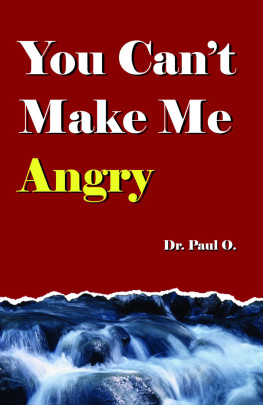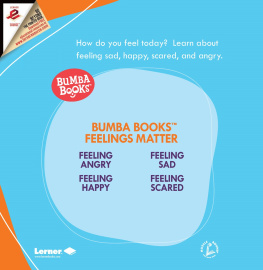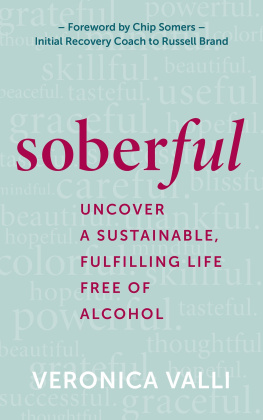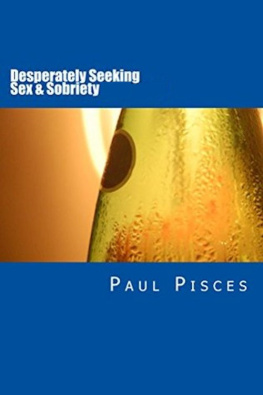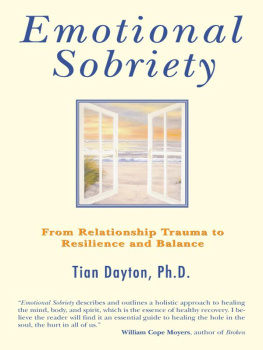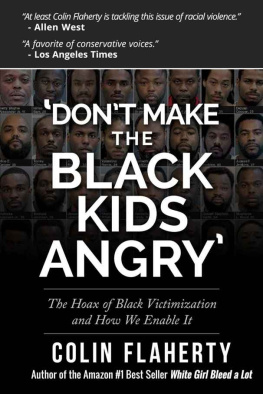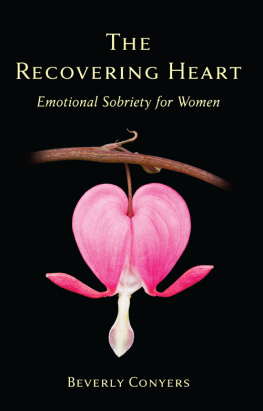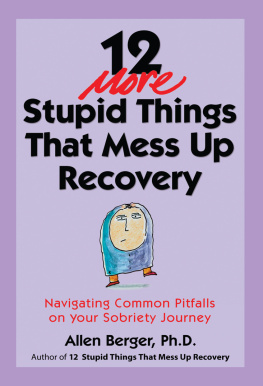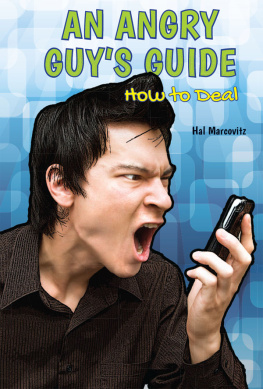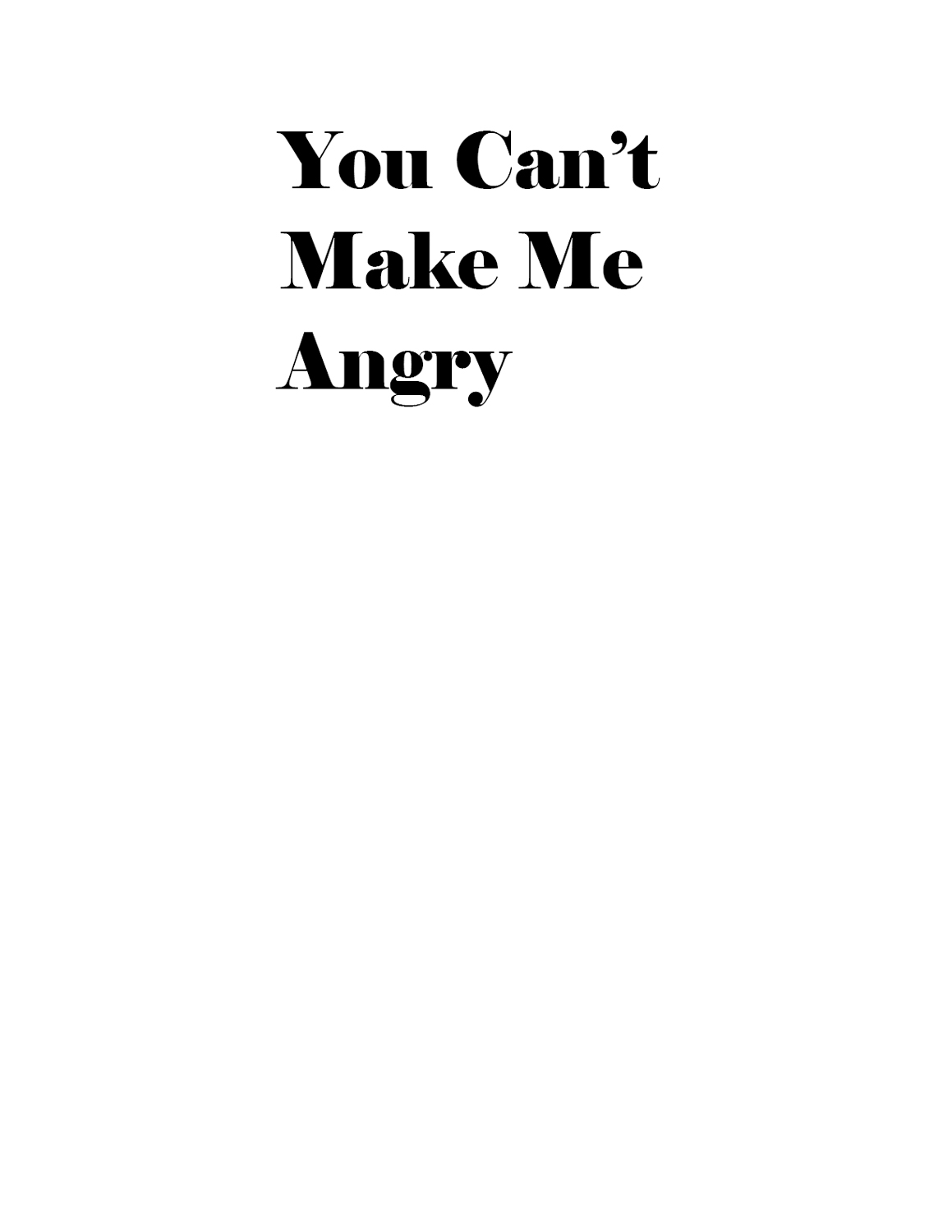
You Cant Make Me Angry.
Copyright 1999 by Dr. Paul O.
All rights reserved. No part of this book may be reproduced or transmitted in any manner whatsoever without express written permission. For information write Capizon Publishing, PO Box 245, Torrance, CA 90507, or .
Publication of this work does not imply affiliation with, approval of or endorsement by Alcoholics Anonymous World Services, Inc.
The ideas and suggestions in the book are intended to supplement, not replace any needed advice of trained professionals. The author and publisher disclaim any liability arising directly or indirectly from the use of this book.
Cover design and photo by Capizon Publishing.
Publishers Cataloging in Publication
O., Paul (1918 -2000)
You Cant Make Me Angry / by Dr. Paul. O.
___p. ___cm
ISBN 0-9659672-1-2
1. AlcoholismPsychological aspects. 2. AlcoholismFamily relationships. 3. Twelve-step programs
HV5278362.2918LCCN: 2002102547
Digital Edition prepared by Gatekeeper Press
Capizon Publishing www.capizon.com
First Printing 2002
First Digital Edition 2022
Contents
Acknowledgments
Thanks to everyone who made it possible for me to write this book. This includes of course all the members of Alcoholics Anonymous and Al-Anon with whom I have come in contact over the years.
Thanks specifically to Ira F. and Bob L. for their time and help with the editing. Special mention in this regard must go to Dick C. who, with his high tech equipment, provided both editing and encouragement in spite of the fact that he is legally blind.
Finally, I want to give special thanks to Sue M. for her long-term friendship, her encouragement and her extensive support.
Thanks also to everyone who deserves to be mentioned. Naming them all would make far too long a list.
Dr. Paul passed away in May of 2000, a few months after completing the manuscript for this book. He has probably been the secretary of a morning meeting somewhere in heaven ever since. His wife, Maxine, joined him there in July of 2001.
ANYONE can become angrythat is easy. But to be angry with the right person, to the right degree, at the right time, for the right purpose, and in the right waythat is not easy.
ARISTOTLE
The Nichomachean Ethics
I am an active member of both Alcoholics Anonymous and Al-Anon, and I occasionally attend meetings of other recovery programs. While this book is directed primarily at members of any of these organizations, non-members could also benefit. To this end, general information regarding the philosophy of A.A. and Al-Anon is included in the appendix.
Although the literature of A.A. and Al-Anon will occasionally be quoted (with permission), detailed suggestions for successfully living those two programs will not be included here. Neither is the information presented here meant to take the place of professional counseling and advice.
Except when specifically stated, all names are fictitious, and characters are composites of several individuals. A reader may at times identify with these and mistakenly assume they are the person being discussed. Such similarities are coincidental. The only exceptions are the stories by Naomi D., Elizabeth H., Judy R., Jane U. and Sue W. These individuals, at my request, graciously submitted their stories specifically for presentation here, and I am indeed grateful to them for this kindness.
One might suppose a person writing a book would know what they had to say and would proceed with saying it. In this case, that is only partially true. Earlier, when I wrote Theres More To Quitting Drinking Than Quitting Drinking, I started with only a general idea of what I had in mind. The more I wrote, the more I understood what I was trying to say. As I continued to write, I understood more and more what I believe, what I think, what I feel, and what is important to me. Writing clarified my thinking and allowed me to become more comfortable being me. I experienced both spiritual and emotional growth during the process. If Im lucky, the same things will happen again this time. In addition, it is my sincere hope that the reader also will benefit as a result of reading this book.
In addition, earlier, and especially prior to my recovery from alcoholism, my behavior resulted in unhappiness and discomfort not only for me but also for a number of other people. By focusing on my emotional sobriety now, and by sharing my efforts with others, I hope to make what are known in A.A. as living amends both to myself and to those people, many of whom are now deceased.
So, if were both lucky, I will grow and learn by writing, and you will profit by reading. In the Preface to her book, Revolution From WithinA Book of Self-Esteem, Gloria Steinem quoted Thomas Carlyle as having said, The best effect of any book is that it excites the reader to self-activity. She ended by saying, If you learn a tenth as much from this book as I have, Ill be a happy writer.
I agree with those statements.
Good Luck and Godspeed to both of us.

Dr. Paul O., Theres More To Quitting Drinking Than Quitting Drinking, (Torrance CA: Capizon Publishing, 2001).
Gloria Steinem, Revolution From WithinA Book of Self-Esteem, (Boston: Little, Brown & Co., 1992), p. 17.
Whos writing this? At the time of this writing, I am 82 years of age and Maxine (better known as Max) and I have been married for 61 years. We hadnt planned on living this long, and we certainly hadnt expected to be married this long.
After I completed pharmacy school, Max and I worked my way through medical school. This was followed by thirty years in the private practice of internal medicine. Twenty of those years were devoted mainly to the treatment of alcoholism and other chemical dependencies. Since retirement, my primary interests have been writing, operating a small publishing business, and involvement in both Alcoholics Anonymous and Al-Anon.
When I was four years old, my father opened a home/drug store combination and I literally grew up in a drug store. My father was successful in that, with considerable difficulty, he survived the Great Depression. I remember him as having been admired by the people in that small community, but at home he was stern, serious, and often ill-tempered. He died rather abruptly when I was 16.
Sadly, I realize now that I am much like my father. Unless I monitor my mood, it drifts into one of irritability, crabbiness and depression. I have always been, at times, hard to live with. Since getting sober, I am no longer able to drink or use drugs. As a result, Ive had to find better ways of dealing with my emotions.
With the recovery program I practice these days, the thought of taking a drink doesnt occur to me. I havent had a drink since July 31, 1967. Yet Im not even thirsty. Staying physically sober presents no particular problem for me. Im amazed at how easy it is for me to accomplish today that which I found impossible before the program.
Emotional sobriety, on the other hand, presents quite a different problem. This requires considerably more of my focused attention. By explaining how I work at it and what I do to obtain and preserve it, I hope to clarify my thinking and become more proficient at maintaining this phase of my recovery. If nothing else, the effort spent writing this will help me focus my attention on this important subject.

